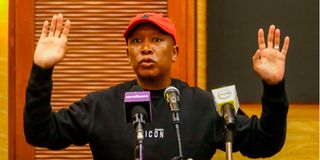Prime
Malema's year of losses as voters, and allies flee to rivals

Economic Freedom Fighters (EFF) party leader Julius Malema speaks during a press conference at Serena Hotel Nairobi on November 10, 2023. PHOTO | NMG
What you need to know:
- Earlier this year, Malema's EFF performed poorly in the South African elections.
In a year filled with significant political upheaval, Julius Malema, the fiery leader of the Economic Freedom Fighters (EFF) in South Africa has found himself grappling with one of the toughest challenges of his political career: the exodus of key allies following a demoralising defeat in the recent elections.
But that wasn’t the first problem. Earlier this year, his EFF performed poorly in the elections, losing popularity to Jacob Zuma’s uMkhonto weSizwe (MK) Party. At the General Election in May, the ANC had more votes but lost the majority, requiring a coalition.
When it finally did, it couldn’t turn to EFF, composed of former ANC stalwarts. It chose the Democratic Alliance, instead.
That was a slap on the face of EFF, largely because it portrayed itself as the alternative, people-backed party to the ANC. But the fissures within Mr Malema's party had begun when it polled just 9.52 per cent support, down from 10.7 per cent in 2019.
Once hailed as a dynamic force reshaping South Africa’s political landscape, the EFF now faces a critical juncture, with the spectre of a potential collapse haunting its foundational structure.
The loss did not carry just numerical implications; it was accompanied by a leadership exodus that drastically altered the party's landscape.
The first tremor was felt with the unexpected resignation of Deputy President Floyd Shivambu, a co-founder of the EFF and a long-time ally of Mr Malema.
Mr Shivambu announced his departure to join the uMkhonto weSizwe (MK) Party, led by former President Jacob Zuma, citing profound differences in vision and direction. Their bond, once forged in the fires of political struggle — rooted in a shared history within the African National Congress (ANC) — now appears irreparably fractured.
As Mr Shivambu’s departure sent shockwaves through the party, other prominent figures quickly followed suit, including Dali Mpofu and the disgraced former Public Protector Busisiwe Mkhwebane.
Mr Malema was visibly shaken by these exits, which diminished his inner circle and cast a long shadow over the party’s unity and stability. Mr Alfred Motsi, another founding member, also resigned to join the MK Party, further amplifying concerns about the EFF’s future.
The loss of key leadership figures has prompted Mr Malema to speak candidly about the struggles of retaining unity amidst the chaos.
He has likened the departures to an "assassination attempt" on the party itself, threatening to disclose compromising information about Mr Shivambu to counter what he perceives as political treachery.
Once a robust arena for Malema's ideals of economic freedom and radical change, the political landscape has now devolved into a battleground riddled with personal conflicts and deepening disillusionment.
In the wake of the fracture, Mr Malema expressed feelings of betrayal by those he once considered close allies. He indicated that several party members were aware of Mr Shivambu’s plans to exit and had conspired against him.
“These people who sat with Floyd and knew Floyd was going. They were at the centre of planning my downfall,” he lamented.
Political analyst Mr Sandile Swana offered an intriguing perspective on the turbulence, suggesting that what appears to be a crisis could potentially lead to necessary reforms within the party.
He mentioned that the EFF might be undergoing a vital "pruning process," akin to horticulture, where the removal of some members makes way for healthier growth.
Mr Swana also stated that some former members have a lack of alignment with EFF’s current direction, while others are to return to their original political roots.
“Malema misread a few things. First of all, I don't feel that there's anything bad about this. I think it's an improvement,” said Mr Swana.
“If I were a horticulturist, I would say that the EFF is going through a very necessary pruning process, and if you go back, for instance, they've just lost Alfred Motsi in the North West, who is an MK guerilla himself was there when the EFF was formed in 2013. He has now deserted the EFF for the MK Party, but when you look at the CV of the man and his activities, he is an MK Party and ANC member at heart. He is just going home when he joins Jacob Zuma and the MK Party.
"So there are people who have joined the EFF and stayed there, but now that the MK party has been formed, they can see their home, their true political home, and they're going to that political home. And the question on the table is whether there's anything in the EFF that they belong to that is good for them if you know what Zuma is good for.
“I think by 2034, the EFF will be a much better organisation than what we have seen now. If Malema was a believer, I think you must thank God for this.”
Amid this backdrop of turmoil, the EFF recently held an elective conference at the Nasrec Expo Centre, where Malema was re-elected unopposed as the party's president, at a conference held between December 12 and 15.
This outcome raises serious questions about the level of dissent simmering beneath the surface and the actual support Mr Malema commands within the organisation. Voting did not occur, and the results were announced immediately because all those nominated ran unopposed.
Entering his third term without a substantive vote may suggest a façade of unity, concealing the discord that could threaten the party’s future, according to the University of Nelson Mandela University (NMU) political analyst, Prof Ntsikeleko Breakfast.
Professor Breakfast has described Mr Malema's leadership style as one that seeks to be “worshipped like God,” arguing that it could undermine the party’s democracy and stability. He added that Malema is a dictator and a leader who doesn’t want to be held accountable for his actions.
“Internal threats are the suppression of a democracy because when you don't practice democracy, people are going to walk out of the party,” he said, referring to Malema’s leadership approach.
“You don't want to explain your actions. You might as well behave like, you know, you are God. Because you can't make decisions then report yourself,” added Professor Breakfast.
Mr Godrich Gardee has been appointed deputy president, taking over from Floyd Shivambu. This position was highly sought after by many within the EFF, particularly by Dr. Mbuyiseni Ndlozi, the party's head of political education.
However, the push for Mr Ndlozi to assume this role ultimately fell through before reaching its full potential, and he did not attend the elective conference.
There has been much speculation about Mr Ndlozi's future within the EFF, especially following recent critical comments from party leader Malema and others, which have raised concerns about his potential departure from the party.
Although Ndlozi has yet to address the perceived animosity directed at him publicly, the signs suggest that he may be sidelined within the EFF. His absence from the significant conference and the party's dismissive tone regarding discussions about him have fuelled such speculation.
When questioned about Ndlozi during a media briefing on Saturday, Mr Malema firmly stated, "We are no longer going to answer any nonsense about Mbuyiseni Ndlozi. This matter is closed. You can talk about it yourself, but don’t bring it to us."
Adding a further layer to the political drama, Mr Malema has accused Mr Mpofu of seeking to dissolve the EFF altogether to back a Mr Zuma-led coalition.
Mpofu, in a candid podcast discussion, expressed his view that smaller parties should rally behind a unified front — a vision many EFF members find troubling. This plan, coupled with the recent instability, implies a chaotic future for the party.
In response to the political fragmentation, Malema positioned the National People's Assembly under the theme of "Defend, Rebuild, and Advance the Struggle for Economic Freedom."
His intention to reclaim the party's former glory underlines the urgent need to fortify its foundation amidst calls for reform and renewal.





